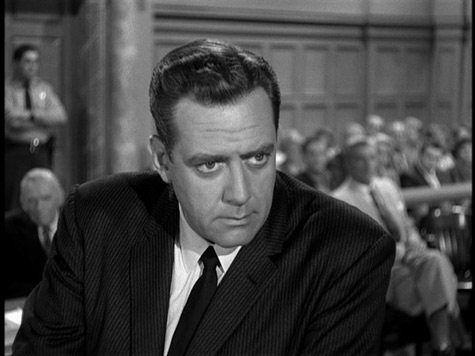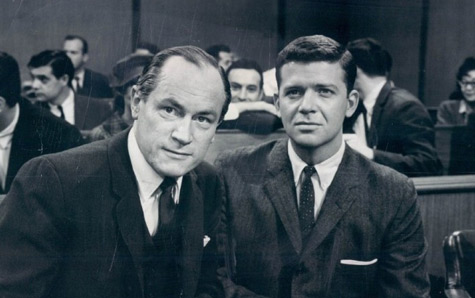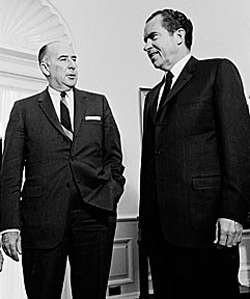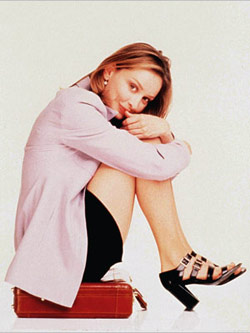
At age nine, I became hooked on the legal/mystery series Perry Mason, then in its fourth year on CBS. The first episode of season 4 aired on September 17, 1960. Despite what the calendar said, it was culturally still the 1950s. Dwight Eisenhower was president (John F. Kennedy would be elected six weeks later). Most television, including Perry Mason, was shown in black and white. Mason’s top assistant, the beautiful, intelligent Della Street, would remain a secretary forever, and presumably a virgin though she was pushing forty. Private investigator Paul Drake chain-smoked through each episode. The police didn’t Mirandize arrestees because the Miranda decision wouldn’t come down until 1966. And network television portrayed attorneys as heroic defenders of justice working in a system that was essentially fair. The fictional Mason never represented a guilty client and won every case.
In that first episode of the 1960 season, titled “The Case of the Treacherous Toupee,” someone murders the tyrannical owner of business and frames Mason’s client. The identity of the suspects is noteworthy only because a twenty-four-year-old Robert Redford played the victim’s prodigal stepson. What’s striking about the episode, though, is that no one questions the fairness of the legal system. District Attorney Hamilton Burger—who must’ve been the consummate politician to win reelection despite losing every case—believes that he’s doing justice. Mason prevails not because he exploits flaws in the system, but because he outwits the murderer. Certain scenes pay lip service to the idea that Mason bends the rules, but the joke is that he never cheats. What competitive nine-year-old boy who couldn’t realistically become a cop, soldier, spy, or centerfielder for the L.A. Dodgers, would fail to find the law an attractive profession?
Over the next year, the country began to change. President Kennedy established the Peace Corps. Bob Dylan made his first appearance at Folk City in Greenwich Village. Russian Yuri Gagarin became the first person to orbit Earth. A white mob in Jackson, Mississippi, attacked the Freedom Riders, part of the vanguard of the civil rights movement, after which twenty-seven Freedom Riders were arrested.

In September 1961, the image of the television lawyer underwent a radical change as well, when the legal drama The Defenders debuted on the CBS. Writing for the Museum of Broadcast Communications, Mark Alvey called the series “American television’s seminal legal drama, and perhaps the most socially conscious series the medium has ever seen.” During the course of the series, Lawrence and Kenneth Preston, a father and son legal team, defend a doctor who euthanized a Down syndrome newborn, a neo-Nazi charged with murder, and a man who killed the person responsible for murdering his wife and son in a Nazi concentration camp. Other episodes explored capital punishment, the rights of adoptive parents, abortion, the definition of insanity, and police wire-tapping. Not much like Perry Mason’s “Case of the Treacherous Toupee,” was it?
In 1964, series creator Reginald Rose said of The Defenders: “The law is the subject of our programs: not crime, not mystery, not the courtroom for its own sake. We were never interested in producing a ‘who-done-it’ which simply happened to be resolved each week in a flashy courtroom battle of wits.” So unlike Perry Mason, with its 1950s sensibility, The Defenders focused on an imperfect legal system, on how prejudices affect the outcome of trials, and on how justice didn’t always prevail. Yet, The Defenders shared a significant similarity with Perry Mason—both series portrayed their lawyer-protagonists as heroic warriors for justice.
The Defenders aired for four seasons, through spring 1965. During that time, I went from a ten-year-old boy to a socially conscious fifteen-year-old teenager living in an America that faced increasing turmoil in the wake of the Kennedy assassination, the civil rights movement, and the country’s growing military involvement in Vietnam. At some point, I decided to become an attorney. I’m not saying that I made the decision solely because of what I saw on television, but as a member of the first TV generation, what I watched as a kid certainly had an influence.

In the years after Watergate, TV’s image of the lawyer has continued to change, and in some sense, decline. The hit show L.A. Law, which ran from 1986 to 1994, dealt with hot topic subjects like abortion, racism, and gay rights, but also portrayed attorneys as fallible, mercenary, and sex-obsessed. 
And yet, though I’ve practiced law for thirty-seven years—during which I’ve witnessed the good, the bad, the irrational, and the downright tedious aspects of our legal system—I still consider Perry Mason and the Preston père et fils the archetypal TV lawyers—icons, really. After all, they served justice, and isn’t that what a good lawyer should do?
Robert Rotstein, author of the upcoming legal thriller Corrupt Practices, is a Los Angeles-based entertainment attorney and law professor.

The fictional Mason never represented a guilty client and won every case.[quote][/quote]Not actually/technically true…
In “The Case of the Terrified Typist” (
Season 1, Episode 38), Mason’s client is actually guilty (
[url=http://www.imdb.com/title/tt0673410/synopsis]http://www.imdb.com/title/tt0673410/synopsis[/url])–though there’s confusion involved with a false identity.
In “The Case of the Deadly Verdict” (
Season 7, Episode 4), Mason’s client is convicted at the opening of the episode (
[url=http://www.imdb.com/title/tt0673237/plotsummary]http://www.imdb.com/title/tt0673237/plotsummary[/url])–though Mason finds the real killer and gets his client off (presumably on appeal) by the end.
In “The Case of the Witless Witness” (
Season 6, Episode 28), Mason loses a civil case during the episode’s opening sequence.